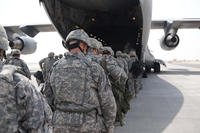Here are some frequently asked questions that we have received, but as always, you should check questions yourself with a recruiter. To get in touch with a recruiter now.
- Lying at MEPS
- Is asthma a disqualifying condition?
- Which branch to join?
- Selling drugs?
- Good ratings for future CIA/FBI career?
- Are allergic reactions grounds for disqualification?
- Joining with tattoos?
- How long to wait for waivers?
- Are antidepressants disqualifying?
- Will (underage drinking) affect my enlistment?
- How can I make the military my career?
- The brutal truth before enlisting
- What makes an officer?
Lying at MEPS
Question:
I had a misdemeanor, petty theft, and my Navy recruiter told me to lie. I was scared, and confused on why he wanted me to lie, though my offense wasn't even disqualifying. My fine was not paid for when I signed, and I had no idea that it was illegal to be processed without fines being paid. I refuse to go into the USN with inaccurate papers. Is it too late to change my papers ... what will happen afterward?
Responses:
1. Need some clarification. Did you admit to the charge? If so and your fine just isn't paid, go pay it. If you didn't mention it, pay the fine and mention it when you ship.
2. You have two choices. Leave it as is ... and play dumb when they come knocking in about 1½ yrs. It takes that long to get a secret clearance, and most rates require secrecy. When you arrive at the ship/command, you will be given interim secret by your CO. This will serve as a "stop gap" until your final secret comes in. When they come knocking and find this skeleton, you will be standing before the man, seabag packed, trying to explain your way out of an honor code violation.
Or you can pay your fine and divulge this to the recruiter. It may void your enlistment contract ... and may require you to choose another rate. However, you don't have to worry about when big brother will come knocking. And you will be in compliance. Peace of mind is everything.
Is asthma a disqualifying condition?
Question:
What is the policy on asthma in the Navy exactly? Do they check your civilian medical records at the MEPS station. I have had asthma past the age of 12 but don't use an inhaler anymore and am perfectly capable of doing all the physical training required.
Response:
Diagnosed with asthma beyond age 12 is disqualifying, regardless of whether or not you use an inhaler. And yes, they can check your medical records if something makes them suspicious, like an asthma attack at boot camp. This would lead to a discharge for fraudulent enlistment.
Which branch to join?
Question:
Hey, guys. I really want to join the military, but I can't find what branch I want to join. I have researched endlessly, but I still don't know. Here are the basics of what I want to do. I love to be outdoors and active, I love to handle guns (of course) and learn hand-to-hand combat. I love to camp outdoors, I love a big challenge and much more. I was thinking of the special forces, but I don't know what branch or anything like that. Please help.
Response 1:
Here are the options as I see them:
Navy: SEAL (Special Forces) is the only thing in the Navy I see suitable for you. (You Navy guys would know better.)
Marines: You just described the Marines, but beware that most of these guys are fanatics (in a good way) and insanely squared away physically. It's a very big challenge.
Army: You just described any combat arms specialty in the Army. Some are more technical than others. Research those (armor, infantry, artillery, military police, special forces) and find what's best for you.
Air Force: Special ops guys are very, very squared away, more technical but very physical as well. Security Forces are the military police of the AF, but with less of a combat role (although this is slowly changing, I believe).
It's a tough choice, I know, but it's one that you have to research and decide for yourself. If you ask specific questions as opposed to this broad one, you'll have more of a chance of getting an answer.
Response 2:
Can't speak for the other branches, but you can get all of that in the Marine Corps. In the Marines, regardless of MOS, you are going to be trained in combat. A lot of the other branches, I think, do not offer this (don't quote me). You have to go to basic combat school in any MOS in the marines or SOI (school of Infantry) if you are in the 03 infantry field. Either way, in almost all MOS's in the Marine Corps, you will be carrying your weapon and be out in the field a majority of the time, and the training is good. The decision is really what you want as well.
Selling Drugs?
Question:
Could I join with a felony? Many years ago, to be exact, 12, I was with the wrong crowd and got caught up in the bad company of drug-selling, but since then, I have been out of trouble and cleaned up my life. I took the test and passed a physical, but they asked about my history. I was denied entry due to my drug charge -- intent to distribute. Could my congressional representative write a letter so I could join the military? I was told by an Army SGT that it is possible. Please help me in this matter. Thank you.
Response:
No branch will take you with a possession with intent to distribute. Doesn't matter what your age was or how long ago. Good to hear that you have turned your life around, but this is one mistake that the military will not overlook.
Good ratings for future CIA/FBI career?
Question:
I was thinking about joining the CIA or FBI after the Navy. If I don't want to stay in the Navy, what are good ratings to increase my ability to get a job with either agency? If I can't be a CTI, what are some other ratings?
Response:
If you are selected by the CIA, you will have to divulge all your financial information (yearly), submit to a polygraph (yearly), hold a pseudonym and more or less tell everyone you work for DoD or some other agency.
If you are considering a career with those agencies, you need a bachelor's ... and a spotless background. CT, IS or anything that requires a SSBI (single scope background investigation, top secret) is a good start. I also think the minimum entry level for the FBI is 21 years old. You may be primed for an agency job right after an enlistment is up.
Are allergic reactions grounds for disqualification?
Question:
A couple of times, I've had allergic reactions to certain types of laundry soap. Haven't had any in the last 3-4 years. Is that a potential setback?
Response:
To a big extent, it depends on what causes the allergic reaction (i.e., the allergen)
An anaphylactic reaction is a DQ.
A reaction that is limited to itching or hives, but no respiratory or cardiac involvement, is not so serious.
However, if you get hives every time you have something common, such as -- for example -- milk or bread or aspirin, they will look twice, at least. Medication allergies are especially tricky.
Given that your reaction, as described, is relatively mild, it may (stress on may) not be that much of a problem. Get documentation from your doc and take it to your recruiter and MEPS.
Joining with Tattoos?
Question:
I am considering joining the Army, however I do not know and have not been able to find in literature if visible tattoos would disqualify a person. Are there any dress codes that restrict this, and if so, is it different in all branches? Thank you in advance.
Response 1:
It does vary.
Each branch has slightly different rules when it comes to visible tattoos, and some of that depends on the job you have in the military. As a general rule, as long as the tattoos aren't found to be offensive, then it generally isn't a problem. But you may want to call and talk to a recruiter about it.
Response 2:
In accordance with AR 670-1 Army -- wear and appearance of the Uniform, Chap 1 -- it specifies about tattoos on the body. You can get a waiver, or you may not need one -- provided that the tattoo is not offensive in any way. Tattoos on the neck above your collar when you wear a regulation shirt, if it can be seen, is disqualifying. Tattoos anywhere that are racist, sexist or offensive in any way are disqualifying. If it is removed, though, then you won't have a problem.
How long to wait for waivers?
Question:
Week 3 of waiting on my waiver.
But I'm hanging in there!! I have positive hopes and know that the surgeon general is just really busy ... but man, it's starting to get to me. I guess I really shouldn't even start to get concerned until two months have passed? I'm not even sure how long waivers normally take.
Responses:
1. Waivers have been known to take up to three months. Hang in there!!!
2. My waiver took a little over three weeks, and it just went through so hang in [there]. It'll get done. It takes awhile. Good luck.
3. Good luck with that. This whole joining process for me (which began in December) has definitely taught me patience, and to not get so worked up about everything and let things just happen. I've done all I needed to do; now I just need to be positive and wait.
Are antidepressants disqualifying?
Question:
What are the consequences for bringing prescribed anti-depression medication?
Response 1:
Antidepressants are disqualifying for one year after you stop taking them. You must stop with your doctor's advice; do not stop on your own. These medications often have to be reduced slowly to lower side effects and reduce risk of relapse. Once you are off and depression free for one year, get copies of your treatment paperwork, including therapy notes, and take them to your recruiter. They will submit the documents to MEPS for review. MEPS either will DQ you, allow you to physical and enlist, or allow you to physical with a waiver (most likely).
Response 2:
You'll need to bring my medical records from the doctor who prescribed the antidepressants. You'll go to MEPS and take the ASVAB, but your processing will be terminated at a certain point because of being honest about depression. Your records will be sent to the AF surgeon general's office for review. This supposedly takes between six weeks and three months -- mine took a full three months.
If the waiver is granted, you'll be cleared to return to MEPS. On your return trip, they'll do a height/weight check, then send you offsite to a psych consult. The doctor will send his recommendation to MEPS, where you will be reviewed further. This took nearly five weeks for me.
If you are deemed fit for service, you will return to MEPS for job selection. Contrary to what I was initially told, depression rules out many jobs in the AF.
Will (underage drinking) affect my enlistment?
Question:
Will this affect my enlistment? I am currently finishing my first year in college and looking to enlist in the Air Force. When I was 18, I received an underage drinking ticket at a New Year's party. It’s been about a year and a half since then. ... I looked it up, and it said it was a "non-traffic ordinance violation." How does this affect my enlistment and job options?
Response:
Not a big deal.
As long as you paid it, talk to your recruiter about it. It could come up and haunt you if you don't.
How can I make the military my career?
Question:
I'm debating between the AF & Navy. Here recently I've been leaning toward the AF. The problem is, I want to make a 20-year career out of the military. I would like to get the best job available and get promoted on a regular basis. I would rather not be cut and sent home, so my question is; How safe would it be to join the AF for the long run, compared to the Navy?
Response 1:
1. If you do well on the ASVAB, more jobs will be available to you. If you get something that you end up not liking, cross-training may be available to you.
2. Promotions are not candy. They aren't handed out on a regular basis, because they're primarily up to you to do what's required of you to gain the rank, along w/ studying for your tests, being involved in military activities and PFT. While there are percentages and ceilings on the amount every time, you're responsible for your promotions in the long run.
Response 2:
If you are coming into the Air Force and you want to earn things through good, old-fashioned hard work, you will be just fine.
If you come into the Air Force and are lazy or don't give a darn and think the world will just come to you on a silver platter? Those are the folks that are going to be weeded out.
The brutal truth before enlisting
Good statement for those considering joining any branch of the military.
We enlist for what we can give, not what we can receive. That's why we call it "The Service;'' we serve others before we even think of serving ourselves.
Your family, friends and your children will miss you as terribly as you miss them, and they'll never want you to leave their side again. It is the sad, true nature of the military family. This is something you're going to have to face square on, or you're doomed before you begin.
You say you want to enlist to provide a better life for your children? Wrong, dead wrong if you're enlisting for the benefits. There are a lot of easier ways to make a living than being in the military, because it's not just a job. It becomes your whole life.
You have to be prepared to drop everything you're doing and leave everything you love in the name of duty. The hours are long, the pay is lousy and the working conditions can be totally brutal, and if you stay around long enough, friends die and you will see combat. It is the true nature of military life.
You enlist to serve your country, because you believe in who you are and what you're doing as an American service member. In fact, you believe so much that you willingly put your life on the line in accomplishment of your unit's mission and, most importantly, to protect the lives of your friends, your fellow service members.
If you're enlisting for any other reason, you're fooling yourself, and you'll make a lousy service member because you're breaking the most basic fundamental trust you make when you raise your right hand and swear in. That basic trust is serving others before you even begin to think of yourself. That's why we call it "The Service" because we serve others, it's as simple as that.
If you can put others before yourself and even your own family, welcome aboard. If you can't, then don't put yourself or the people around you in that situation, because you won't be any good to your friends or your unit.
Be sure you explore all options before you sign the contract and give your oath in order to ensure you achieve the kind of life you truly want. Best of luck and may God grant you everything you seek.
Semper Fi
What makes an officer?
Question:
Being an outsider looking in, I do not understand how a "college graduate" can have such a vital role in such a short time. Why does the military put the power in a 25-year-old college grad's hands and allow their authority to override a 20-year veteran master sergeant?
It does not make sense to me. Is it thought officers are a better breed, a tougher competitor or a person who has more brainpower over a non-college grad?
Are officers thought to be wealthier, better organized and better thinkers?
Response:
Any second lieutenant who tries to lord his rank over an E-7 or E-8 with 20 years of service is destined for a short military career.
The commissioned officer has the authority; the non-commissioned officer has the experience. If they do not work as a team, the unit will suffer greatly. A major part of that NCO's job is to help train that young officer and keep him from making stupid mistakes that can end his career and/or get someone seriously hurt or killed.
Another way to look at it is...
The officer's job is to set the standards.
The NCO's job is to enforce those standards.
It helps to not have the same person doing both parts, because you can lose your sense of objectivity trying to enforce your own policies.
Interested in Joining the Military?
We can put you in touch with recruiters from the different military branches. Learn about the benefits of serving your country, paying for school, military career paths, and more: sign up now and hear from a recruiter near you.














